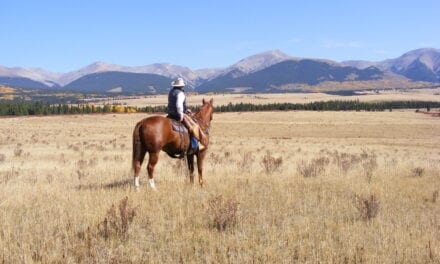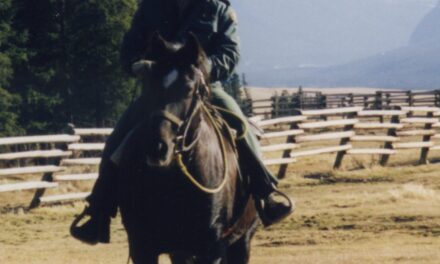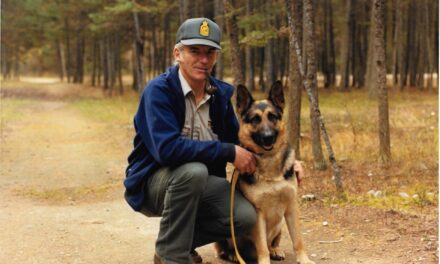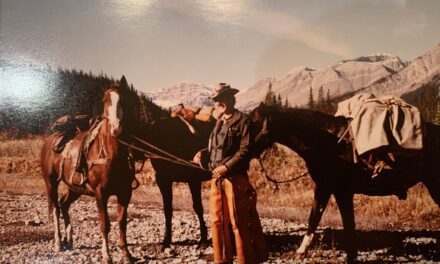• (1:27:33) Don – We had a number of volunteers and Grace would phone around, but me being in the same house would end up going a lot. It was just hard to get somebody, especially late at night. We had to go through snowstorms to Golden with screaming people – sometimes dead people.
• (1:28:05) Grace – BC Ambulance was working out of Cranbrook, so it wasn’t out of the park. It was under the BC Ambulance Service.
• (1:28:14) Don – If it was anything more than a bent toenail, we took them to Banff anyway. If you took them to Golden, they’d turn around and send them back to Banff, if it was anything really serious. We had to drive into Banff a lot.
• (1:28:30) Grace – There were a lot of terrible accidents in Yoho.
• (1:28:33) Don – The accidents on the Field Hill were just horrible…you’d end up there on traffic control and people would be bouncing off the guard rails in front of you. It was just scary. I was actually really glad to leave the highway. When we got to Banff…they had ambulance service. The wardens used to do it sometimes and they still did it once in a while, but I think I was maybe on two highway accidents all the time that I was Banff. Just because I happened to be around when they happened. More than being called to them.
• (1:29:20) I was front country manager for a few years in Banff and then they changed everything in 1991/92. I was front country and I think Gord Irwin was backcountry and Keith was still our boss. Then they changed it all and they eliminated some of the jobs. I can’t remember who was what anymore. They eliminated the front country job and then it didn’t work so they reinstated it, but meanwhile I got the cultural resource job. That was the best job. That was 1992. Then I stayed with that until 2003. I think I was there, 11 or 12 years.
• (1:30:16) Grace – You took a special program up in Edmonton…
• (1:30:20) Don – Yeah, I took a cultural resource management course in Edmonton, a university course. I went up there quite often. It was a like a series of two- or three-day courses for two years.
• (1:30:41) Don – I was with the Parks for about…34 years. A bunch of them were in pieces like all those seasonal years in Rogers Pass, I added them up to four years and I bought back two. I had from 1972 to 2003…I think that I got a pension for 32 years, but I worked for 34/35….I was part time for just a year and a half actually…
• (1:31:39) Don – I used to joke because all my friends were wardens at Lake Louise, you know Jay, Joe, Andy and all those guys. We socialized as well as when we worked there. I can remember joking with them, saying ‘Well, if I ever get tired of working for a living, I’ll come and work for you guys!” – “What do you mean? Oh shit, you couldn’t do it!” And I just got on by the skin of my teeth and all my friends, Dale and Bob and all those guys had been on the warden service for years before I got on. Some got on in 1967. I put in then too, but there was a bit of skullduggery going on! Keith Foster who worked for us got on the warden service then. He was working for the forestry. Dale Loewen was hired. He had been working for the forestry. Several others put in. It was a big hiring time. I filled out an application and I gave it to Wally McPhee at Lake Louise. Wally and dad were real buddies. Dad wasn’t too keen on me leaving…So dad and Wally got into a bottle of whiskey. I shod Wally’s horse a couple of times. He bought a quarter horse from my grandmother. He lived at the warden station right at Lake Louise, about where the King’s Domain is now. I remember him saying, “Come on in for a cup of coffee Don. I want to talk to you.” He had my application form. He said, “You know, you and your dad have a really good thing going here. Why the heck would you want to change that and come work for the government?” By the time I had left, he had talked me out of applying and I had ripped the application form up! The lights came on a little while later! I could just see Dad and Wally having a conversation and Wally saying – I will talk to that boy.
• He (Don’s dad) was smiling when I did get on the warden service a few years later because he had done a lot of poaching in years gone by. I used to help him still quite a bit too. I think it was from him having to live off the land basically. So, we did that ever since I was a little kid. I didn’t even know what beef tasted like until I grew up!
• (1:34:47) Don – I have to say it was the backcountry (was what Don liked best about being a warden). Just being out there where the park was, you know. To me that was what it was all about. I think it came from when we lived in the foothills and then in Skoki…and in the backcountry, traveling all over the park with trips and horse pack trips. I remember that first year that I went back as a park warden in Cyclone. Paul Peyto had been a warden and when we were guiding, he used to come and help us out on his days off. I was riding into Skoki with the pack horse to Cyclone and I met Paul on the trail coming out. We both started to laugh because 10 years before it would have been the other way around, now he was the Outfitter and I was the Warden.
• Nothing much has changed back there. I had a story when I was guiding, one time we were chasing horses and I got knocked off my horse by a limb, kind of a low limb on a jack pine tree between Skoki and the Little Pipe (Little Pipestone Creek)…As a warden I was riding down this trail and I recognized that very same limb, 20 or 30 years later! I thought, you know, nothing has changed, a few things, but really not a lot.
• (1:36:18) Don – To me that was what the parks were all about and what we were protecting there. That I think is why I really liked working with the cultural resource stuff too. I worked with Gwynn Langemann and Bill Perry (Parks Canada archeologists), as you know and we were working on pit houses out by the Red Deer river. I don’t know how many times I’ve ridden up and down the Red Deer. To ride from Red Deer Lakes it is about 18 miles down to Scotch Camp and then 12 miles out to the ranch (the Ya-Ha-Tinda). When riding along you think “Maybe I will see an elk, or a deer, or a bear or something.” When we were working on the pit houses, we were looking at people who had been there three thousand years before us and they were living in the valley! It made me look at the whole parks with different eyes. All this ancient history was there that I didn’t know about. I brought the archeologists in to some pit houses… there were some out by Scotch Camp. Marty Magne and Bill Perry were out there…and they showed me the pit houses and I said, “That looks just like those divots out at Drummond Glacier. I thought that they were old garbage dumps.” They said, “Oh really?” The next day we rode up there and dug a pit and it was full of ash layers, chert flakes and carbon…There were eight pit houses out there. We excavated three or four of them and we found old bison bones and tools, flakes and arrow heads…It was like a layered cake, there was silt and carbon, silt and carbon. They were able to get the years from each layer pretty well. They were about 3000 years old…I had spent so much time in that country and then seeing it differently was what I really enjoyed about that job.
• (1:38:32) Don – And the people you worked with. It was like a family. There was a real camaraderie and it was a great place to raise a family. When we were in Yoho on our days off, a lot of times…we could still go up the old fire roads or hike. We would go up say to one of the warden cabins up Ottertail or Ice River and take the kids. I remember one time we were up at one of the cabins and it just rained the whole time that we were there. The kids were in the cabin doing pictures. We hiked into Little Yoho and different places quite often…O’Hara…both the girls love that lifestyle yet, you know. I am sure that you are the same. There was a special thing about that, I think. I remember (warden) Charlie Pacas and I were working together and Katie (Charlie’s wife) was pregnant. We were working at Scotch Camp. We went out in the fall and I took Flora and Johanna and Katie. Charlie and Katie were going to come back the next day. Because it was in the fall, we were able to drive around and go into Scotch Camp. I have this old picture of Katie and Charlie and the kids; we were all sitting up on this hillside looking around. They were having a lot of fun, just running around out in the meadow…there was a real good feeling about that. I think it put a foundation for their lifestyle now.
• (1:40:33) Don – I think that the majority of the wardens all worked well together. It was part of a team building thing from good leadership too. Most of the chief wardens at first were old army guys you know and a bit autocratic, like Hal Shepherd and guys like Bob Hand as I said…But there was sort of a reward thing. Like Hal was a good example. “Good job boys!” And you always felt good when he said that. He would give you shit all the time too! But it was in a good way. Of course, around the 1970s, we all had our hair too long. “Cut that goddamn hair!” He would flip your pockets up if there was a button undone and hit you in the nose. His military training was a part of his character.
• (1:41:30) Grace – He had one eye.
• (1:41:30) Don – One eye yeah (the other was glass). He looked like John Wayne. He (rode a motorcycle). He wasn’t afraid of anything. “You boys stay back. I will take care of this.” We had this one time in Yoho, some guys that had broken out of prison in Vancouver. Word was that they were coming to Yoho. So, there were RCMP and us watching…Anyway these guys were reported on the road…” You boys stay back, I’ll take care of this!” He walked out with his shotgun and he had this army cap on, rather than a Stetson. Hal stepped out in front of them and this guy had broken prison and…he gave right up! He said, “I’ve been in the big time with some real killers and I knew this guy wasn’t fooling! “There was another time too, Tim was in on that …some young people came through and they had broken into someone’s house and had stolen some guns, booze and a car. They stopped in Field. They had run out of gas. There was a young Mountie there and he saw guns in a car. Anyway, the kids scattered. But they (the officials) thought it was the people who broke prison so Hal had us all over the place. I remember he had Darro on a bridge with a rifle. These guys had escaped and took off. Tim Auger and I were driving down by the tracks and two young girls, probably 17 were walking along the tracks and we said, “What are you people doing?” “Oh nothing…” It was the two girls from the stolen car. We stopped them and all the Mounties came in. They were from Cranbrook and other areas of BC.
• (1:44:33) Don – In Yoho a lot happened there. A highway park…but there was also a lot of mountaineering, a little bit of everything. It was a good park to work in.
• (1:44:47) Grace – Oh yes (in response to the question, “Did you worry about him when he was called out?”) But after a while you just give up worrying because you can’t do anything about it.
• (1:45:00) Don – I probably risked my life more before I was in the warden service…Well, I shouldn’t say that, but I had a few close calls!




Very cool, I am currently in my 5th year working at skoki, as the hauler, a lodge attendant and as a landscape artist, I have just tried to do a deep dive of a June mickle painting I have found in the managers cabin from 1954 of Baker lake and packers peak! If you guys have any info on it or any directions to point me that would be wonderful